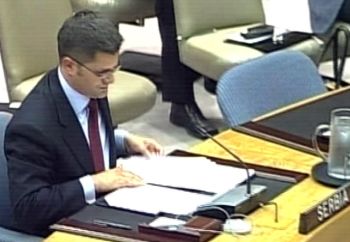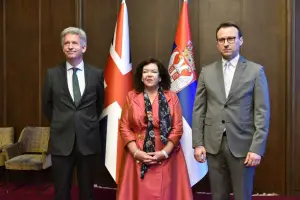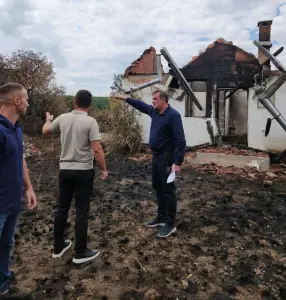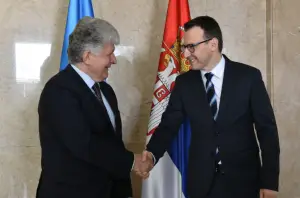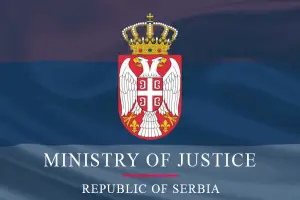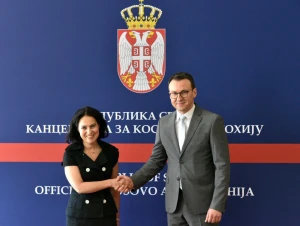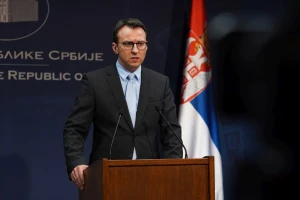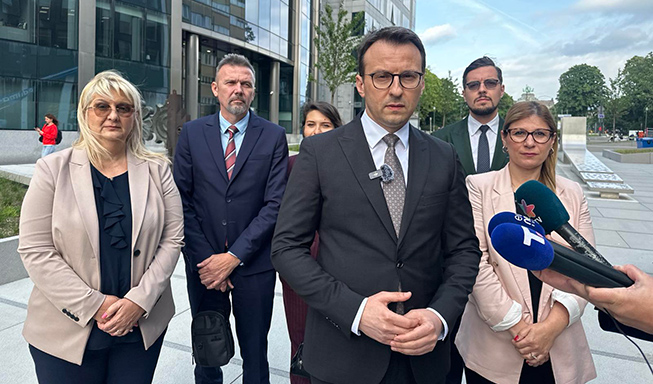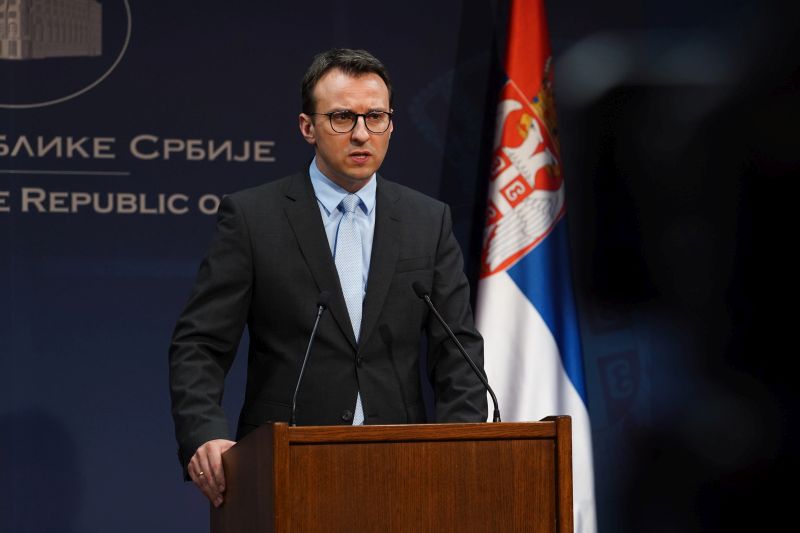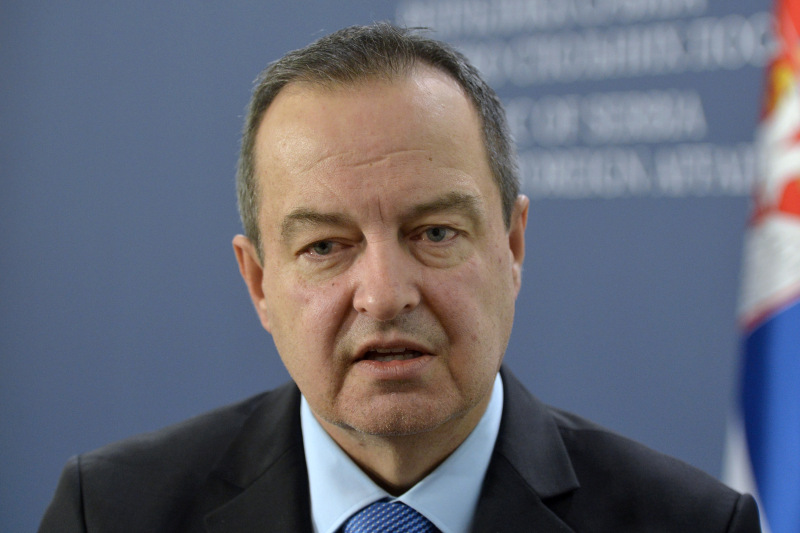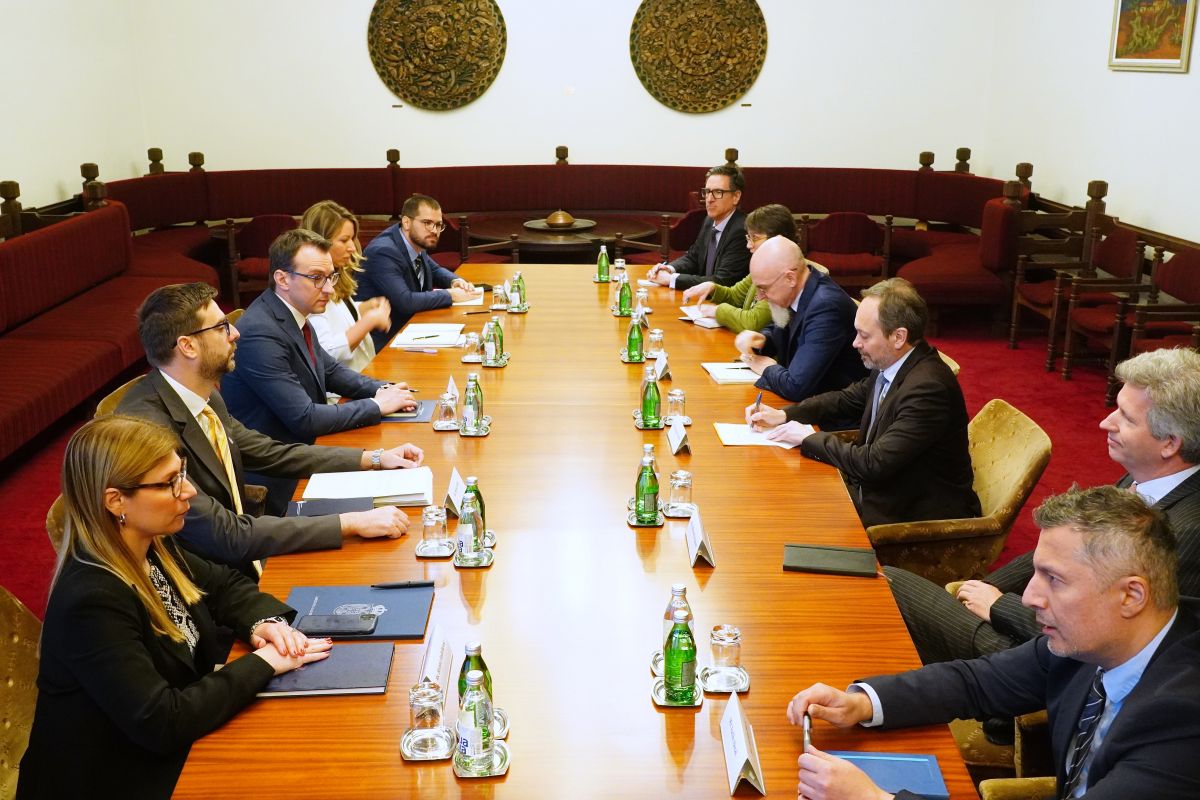Q:
A:
Jeremic calls on UN SC to back Serbia’s initiative for conducting comprehensive investigation
Belgrade/New York,
12 May 2011
Minister of Foreign Affairs Vuk Jeremic called on UN Security Council members today to back Serbia's initiative for launching a comprehensive, independent investigation into the illegal trade in human organs in Kosovo under the UN auspices, because otherwise we would be facing double standards.
Jeremic stressed at the UN Security Council session dedicated to Kosovo-Metohija that no existing institution would be able to conduct a comprehensive investigation or to ensure cooperation of all necessary parties.
Only a mechanism created by the Security Council could to that. Otherwise, those suspected of participating in illegal trade in human organs might remain out of reach, the Minister warned.
Jeremic stated that Serbia will not give up, or retreat until the full truth about what happened is discovered. He added that Serbia forwarded a formal proposal for the launch of this investigation to the UN Security Council.
This is our solemn obligation toward all victims of these heinous inhumane deeds and their families and we cannot let them down, the Minister said.
He underlined that all previous investigations of war crimes committed in the Balkans were conducted under the mandate of the Security Council and added that Serbia is asking nothing more, but it also has no moral right to accept anything less. If all investigations of war crimes committed by Serbs were conducted under the mandate of this body, then why the investigation of crimes against Serbs would not be under the mandate of the same body? Without intention to be malicious towards anyone, but with a firm belief we ask: what could be the explanation for such double standards, Jeremic said.
In his opinion, this investigation is an integral part of the reconciliation process, as well as a prerequisite for the establishment of lasting peace between Serbs and Albanians in the Balkans.
Justice will not be done if someone who is involved in the trafficking in human organs does not respond appropriately for his acts due to jurisdictional restrictions or mandates, the Minister pointed out, adding that in this context the capacity of EULEX for conducting this investigation should be examined.
He explained that EULEX can operate in Kosovo only and nowhere else, meaning not in the places where traces lead us – and these are not only various European countries, but also parts of Africa, Asia and Middle East.
Jeremic referred to the case "Medicus" and the fact that two leaders in the chain which dealt with illegal organ transplants fled Kosovo and cannot be extradited.
And although EULEX pressed charges against a certain number of Kosovo Albanians related to this crime, and even if we suppose that all those who are detained by EULEX will get convicted, justice will be done only partially, he noted.
The Minister said that EULEX should have the main role in discovering truth about what happened related to this case in Kosovo itself, but in order to do that, the EU Mission must demonstrate that it is independent from institutions of Kosovo Albanians and improve witness protection.
EULEX must also act more decisively when it comes to former Kosovo minister of transport and telecommunications Fatmir Limaj, who is accused of war crimes, Jeremic warned and added that the UN Secretary General Ban Ki-moon highlighted in his report that it has been more than two months since EULEX is trying to resolve the issue of Limaj’s immunity.
He noted that dialogue between Belgrade and Pristina is underway and that certain progress has been made. He stressed that the UN should participate in these meetings.
Jeremic called on all those who insist that the UN should be excluded to consider their position, especially in light of what the Secretary General said – that effective information exchange and reporting on dialogue should be ensured.
In his opinion, the role of this body in defining and securing the legitimacy of the solution is of essential importance.
Talking about the situation in Kosovo, Jeremic referred to the words of the UN Secretary General that the situation in southern Kosovo is gloomy and that internal political turmoil marked the period for which the report is made.
Also, in its recent report Europol marked Kosovo as Europe’s centre of organised crime and drug trafficking, especially heroin, the Minister said and warned about the latest events in Kosovo which are putting in great danger the cultural and religious heritage.
The real situation can be best seen on the example of Virgin Ljeviska Church in Prizren, which was included on UNESCO’s list of world heritage in danger after the 2004 pogrom. Nevertheless, it is still the target of extremists, Jeremic said.
KFOR's commitment to remain present in the vicinity of the most important Serbian holy sites is essential, the Minister underlined, adding that this applies to the monasteries of Devic, Visoki Decani and the Pec Patriarchate, and the Virgin Ljeviska Church.
Only a mechanism created by the Security Council could to that. Otherwise, those suspected of participating in illegal trade in human organs might remain out of reach, the Minister warned.
Jeremic stated that Serbia will not give up, or retreat until the full truth about what happened is discovered. He added that Serbia forwarded a formal proposal for the launch of this investigation to the UN Security Council.
This is our solemn obligation toward all victims of these heinous inhumane deeds and their families and we cannot let them down, the Minister said.
He underlined that all previous investigations of war crimes committed in the Balkans were conducted under the mandate of the Security Council and added that Serbia is asking nothing more, but it also has no moral right to accept anything less. If all investigations of war crimes committed by Serbs were conducted under the mandate of this body, then why the investigation of crimes against Serbs would not be under the mandate of the same body? Without intention to be malicious towards anyone, but with a firm belief we ask: what could be the explanation for such double standards, Jeremic said.
In his opinion, this investigation is an integral part of the reconciliation process, as well as a prerequisite for the establishment of lasting peace between Serbs and Albanians in the Balkans.
Justice will not be done if someone who is involved in the trafficking in human organs does not respond appropriately for his acts due to jurisdictional restrictions or mandates, the Minister pointed out, adding that in this context the capacity of EULEX for conducting this investigation should be examined.
He explained that EULEX can operate in Kosovo only and nowhere else, meaning not in the places where traces lead us – and these are not only various European countries, but also parts of Africa, Asia and Middle East.
Jeremic referred to the case "Medicus" and the fact that two leaders in the chain which dealt with illegal organ transplants fled Kosovo and cannot be extradited.
And although EULEX pressed charges against a certain number of Kosovo Albanians related to this crime, and even if we suppose that all those who are detained by EULEX will get convicted, justice will be done only partially, he noted.
The Minister said that EULEX should have the main role in discovering truth about what happened related to this case in Kosovo itself, but in order to do that, the EU Mission must demonstrate that it is independent from institutions of Kosovo Albanians and improve witness protection.
EULEX must also act more decisively when it comes to former Kosovo minister of transport and telecommunications Fatmir Limaj, who is accused of war crimes, Jeremic warned and added that the UN Secretary General Ban Ki-moon highlighted in his report that it has been more than two months since EULEX is trying to resolve the issue of Limaj’s immunity.
He noted that dialogue between Belgrade and Pristina is underway and that certain progress has been made. He stressed that the UN should participate in these meetings.
Jeremic called on all those who insist that the UN should be excluded to consider their position, especially in light of what the Secretary General said – that effective information exchange and reporting on dialogue should be ensured.
In his opinion, the role of this body in defining and securing the legitimacy of the solution is of essential importance.
Talking about the situation in Kosovo, Jeremic referred to the words of the UN Secretary General that the situation in southern Kosovo is gloomy and that internal political turmoil marked the period for which the report is made.
Also, in its recent report Europol marked Kosovo as Europe’s centre of organised crime and drug trafficking, especially heroin, the Minister said and warned about the latest events in Kosovo which are putting in great danger the cultural and religious heritage.
The real situation can be best seen on the example of Virgin Ljeviska Church in Prizren, which was included on UNESCO’s list of world heritage in danger after the 2004 pogrom. Nevertheless, it is still the target of extremists, Jeremic said.
KFOR's commitment to remain present in the vicinity of the most important Serbian holy sites is essential, the Minister underlined, adding that this applies to the monasteries of Devic, Visoki Decani and the Pec Patriarchate, and the Virgin Ljeviska Church.

